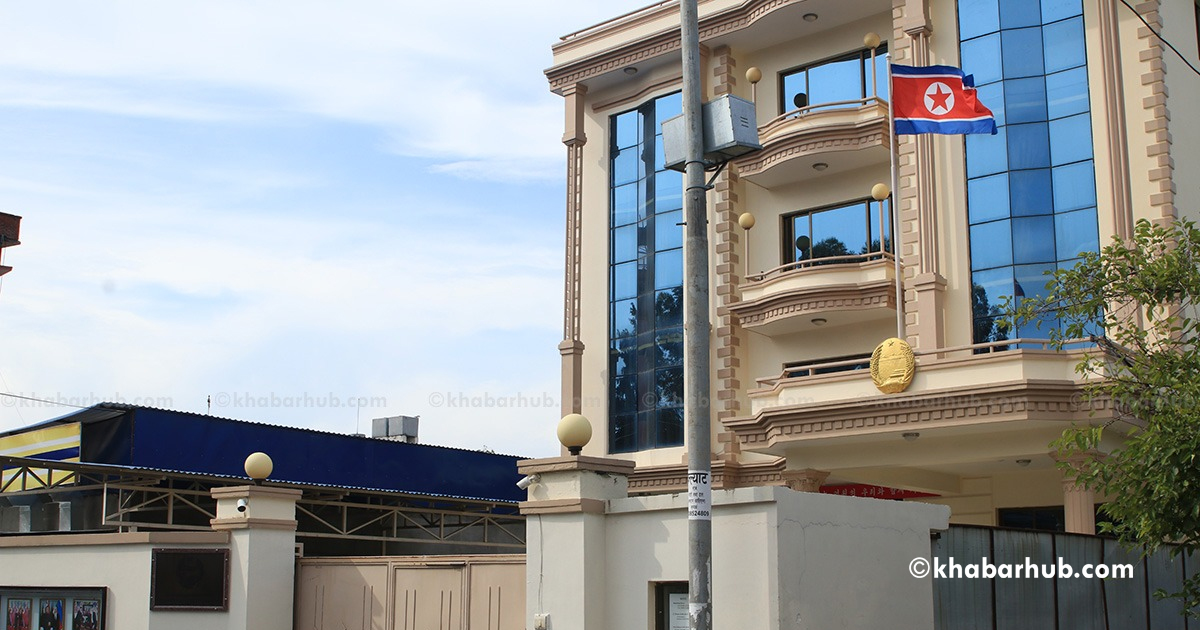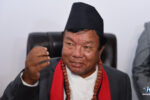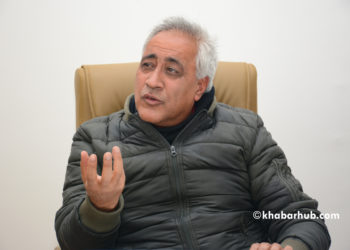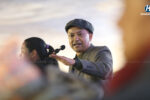KATHMANDU: North Korean Ambassador to Nepal Jo Yong Man was euphoric when he came to Nepal in 2018. The North Korean government appointed an experienced and qualified Jo Yong as the ambassador to Nepal by giving Nepal a high priority.
Jo Yong has already served as the North Korean Ambassador to South Africa and holds good command over English, Spanish and other languages, too.
Jo Yong had met with top leaders of Nepal Communist Party (NCP), Nepal Peasants and Workers Party (NPWP), NCP (ML), journalists and other organizations loyal to the North Korean leader, before presenting his credentials.
Earlier, Jo Yong was dragged into controversy after a North Korean diplomat was arrested for smuggling rhino’s horn during his tenure as the ambassador to South Africa.
Ambassador Yo Jong also resumed meetings of Joint Consultation Mechanism (JCM) between the foreign ministries of the two countries that had remained inactive since it was formed in 2001 with the aim of increasing North Korean investment in Nepal and organizing high-level state visits.
Isolated by the international community, North Korean diplomat Jo Yong took the initiative in using the Nepali land to evade sanctions imposed by the United Nations (UN).
Earlier, Jo Yong was dragged into controversy after a North Korean diplomat was arrested for smuggling rhino’s horn during his tenure as the ambassador to South Africa.
Kim Yong Hak, who preceded Jo Yong as the North Korean Ambassador to Nepal, was also fluent in the Nepali language, had maintained good terms with leaders, businessmen, and journalists of Nepal.
Hak had been familiar with Nepal since he was a student as his father had served as the Korean Ambassador to Nepal.
He had served as the North Korean envoy to Nepal for two terms prior to this. He used to look after Nepal affairs even while he was in North Korea. With the appointment of the new envoy, North Korea had shown interest in opening its consulate in Nepal.
The diplomats had also worked illegally in Bangladesh and Sri Lanka prior to coming to Nepal in the interest of North Korean dictator. They had lobbied with Nepali and leaders and businessmen to invest in various fields including agriculture, hydro, IT and restaurants in Nepal.
Meanwhile, North Koreans began to secretly collect information on banking sectors and started launching cyber-attacks against western countries in the cover of operating IT companies.
Jo Yong’s activities worried western countries as his activities were against the diplomatic norms. Further, he was maintaining good terms with Nepali leaders.
The Nepal government had become soft on the North Korean government after South Korean Embassy supported North Korea to invest in Nepal.
German car manufacturer Volkswagen had refused to sell the car meant for Ambassador Jo Yong Man at the eleventh hour citing the UN sanctions. The U.S. had written to Nepal’s Foreign Ministry for the third time on June 15 saying that it was concerned over illegal activities of North Koreans in Nepal.
A foreign diplomat had attributed the South Korea’s briefing to the delay in the implementation of the UN sanctions. Sources said a South Korean diplomat had told the Nepal government to allow North Korea to invest in the areas including restaurants except those fields including IT and those that directly harm the western countries.
The US lost its patience after the Korean companies were established in Nepal and the North Korean government announced that over 55,000 North Korean citizens would take part in the Nepal Visit Year 2020.
The Security Council of the United Nations on December 22, 2017 had unanimously adopted resolution 2397. The UN Security Council has been imposing sanction on North Korea to stop its nuclear weapons and missiles.
Meanwhile, Khabarhub had published a series of reports about the incidents of cyber-attacks launched by North Korea against western countries.
Following the exclusive report carried out by Khabarhub, international car manufacturers in Nepal had refused to sell a vehicle to the North Korean Embassy.
German car manufacturer Volkswagen had refused to sell the car meant for Ambassador Jo Yong Man at the eleventh hour citing the UN sanctions. The U.S. had written to Nepal’s Foreign Ministry for the third time on June 15 saying that it was concerned over illegal activities of North Koreans in Nepal.
The South Korean Embassy in Nepal that had signed a joint letter sent to Foreign Ministry last year, had shown sympathy to North Korean this time refusing to participate in U.S. attempt to press Nepal. Nepal’s decision to ban North Korean investment in Nepal comes ahead of the 74th United Nations General Assembly (UNGA) that kicked off on September 17.
During a meeting with Foreign Minister Pradeep Gyawali on December 18, 2018, U.S. Secretary of State Mike Pompeo had requested the former to curtail illegal activities of North Koreans in Nepal.
U.S. Secretary of State Pompeo had told Foreign Minister Gyawali that the U.S had embraced a diplomatic method to make North Korea relinquish its nuclear programs as per the U.S. policy to maintain peace in Korean Peninsula.
He, however, had asserted that the U.S would continue to press North Korea to abandon its nuclear aim. During the meet, Foreign Minister Gyawali had vowed to close illegal activities of North Koreans in Nepal.
But, the government had failed to take any concrete step to that end. According to sources at Foreign Ministry, North Korea was given an ultimatum till October end to take back investment from Nepal assuming that the U.S could press Nepali authorities on the issue during the United Nationals General Assembly (UNGA).
Before the formal diktat, Nepali officials had held discussions with the Deputy Head of North Korean mission in Nepal, Kim over the past one month on the issue. Nepali officials had told Kim to close down businesses and return the workers due to pressure from the UN and the U.S. while assuring him that the decision can be rolled back at an appropriate time.
But, North Korea refused to shutter the business and started lobbying to extend the visa of 14 North Korean workers working illegally in Nepal. A UN official in Nepal refusing to be named told Khabarhub that even if Nepal was late to enforce its commitment, the move is welcomed.
Saying that they are aware that Nepal had made the move to save it from a possible pressure during the UNGA, he said that they will continue monitoring to make sure the sanctions are strictly implemented. UN Security Council had imposed the sanction on North Korea and it is mandatory to every UN member country to press North Korea to give up its nuclear programs.
According to the official, North Koreans were involved in constructing ships in Bangladesh and Sri Lanka and after the projects were scrapped as UN drew the attention of the concerned authorities, they started focusing in Nepal.
Decision taken after diplomatic pressure
The United Nations had repeatedly reminded Nepal through different channels about North Korean illegal activities in Nepal pressurizing the latter to comply with the UN sanctions that North Korea has been facing.
The Government of Nepal had earlier shown reluctance to rein in North Korean activities in the country and to shut down businesses run by North Korea despite the reminder of the UN.
In August this year, the UN in a letter to the Ministry of Foreign Affairs (MoFA) had asked the latter to strictly execute the sanctions imposed on North Korea. Meanwhile, the United States had also reminded the government of Nepal regarding the UN sanctions against North Korea and the international obligation of the Government of Nepal to follow UN resolutions.
Since Foreign Minister Gyawali failed to live up to its assurances to shut-down North’s activities, US officials reiterated their stance on the issue during their Nepal-visit.
David J. Ranz, acting Deputy Assistant Secretary, Bureau of South and Central Asian Affairs, who visited Nepal in May this year during his meeting with Ram Bahadur Thapa, the Home Minister of Nepal, had drawn his attention regarding the illegal activities being carried by North Koreans here.
Likewise, US special envoy Mark Lambert during his visit to Nepal in June this year had raised concern over North Korean activities in Nepal while expressing the fear that North Koreans might have been using Nepal as a base to commit cyber-crimes, and other illegal activities.
Similarly, assistant US trade representative Mark Linscott, during the Nepal-US Trade and Investment Framework Council meeting held in Washington DC in November last year, had warned that failure to check North Korean activities in Nepal could adversely affect Nepal and US trade.
According to foreign ministry sources, the US authorities had warned that the diplomatic efforts could switch on to ‘pressure’ if Nepal failed to take concrete steps to shut down all illegal North Korean activities within the end of 2019.
US Ambassador to Nepal Randy Berry, too, had repeatedly reminded the incumbent government ministers, highly-placed government officials, the army and police officials regarding the North Korean activities in Nepal.
MOFA sources said US Ambassador Berry had also raised the issue during his talks with MoFA Secretary Shanker Bairagi some two weeks ago.
Earlier in 2015, the government had expelled 54 North Koreans — who had come to Nepal in tourist visa — involved in tunneling in Sindhupalchowk district. Likewise, the government had denied visa to two North Koreans in last August.
Nepal has lately initiated action against North Korea following international pressure, mainly from the UN and the US. The Federal Bureau Investigation (FBI) had also produced evidence of North Korean’s involvement in the hacking of NIC Bank in Kathmandu to Nepal’s Central Investigation Bureau (CIB) through the Kathmandu-based US Embassy security officials.
Security experts take
On September 16 this year, the government of Nepal gave a two-month ultimatum to North Koreans to shut down their businesses in Nepal and take back their investments.
The government’s decision to ban North Korean investment in Nepal came after the UN repeatedly raised the issue with the Nepal government thus pressurizing the latter to comply with the UN sanctions.
Former chief of the National Investigation Department (NID) Devi Ram Sharma said Nepal would be obliged to shut-down businesses and activities of North Korea, which has been currently facing UN sanctions.
“UN has imposed sanction on North Korea. Hence, Nepal, being a member of the UN, is obliged to act on the basis of moral grounds,” Sharma told Khabarhub.
He said that Nepal needs to pay the price if it went against the UN interest. “Nepal should have shut-down all North Korean’s businesses a long time ago,” he said.
Likewise, retired Nepali Army (NA) Major General and security analyst, Binoj Basnyat lauds the government’s decision as positive. “The government should have taken seriously when such activities were exposed,” he said adding, “It is a weakness on the part of the government of not being able to sense illegal activities being carried out by a foreign country.”
“This is a glaring example of the government’s weak mechanism,” Basnyat added. Former DIG of Nepal Police, Hemant Malla said the government needs to be extremely serious about banning North Korean businesses and activities in Nepal. “Nepal should have taken its own initiative, not wait for external powers to dictate,” he said adding that this development has revealed Nepal’s weak security mechanism.
Senior advocate and human rights defender Dinesh Tripathi said Nepal should not shy away from taking action against North Korean activities in the country.
Also Read:
Govt bans North Korean investment in Nepal
North Korean Embassy lobbying for visa extension of its illegal workers in Nepal
Inside story of North Korea’s multi-faceted illicit cyber activities
North Korean illicit activities go unabated in Nepal
Illegal North Korean hospital shut down in Nepal
North Korean Embassy requests Khabarhub to delete ‘unproductive articles
US expresses concerns over North Korean’s illegal activities in Nepal
Sans work permit, North Korean doctors work illegally in Nepal
North Korean hackers multiply as Nepal govt. turns blind eye
Car manufacturers refuse to sell vehicle to N Korean Embassy
North Koreans operate cyber espionage from Kathmandu’s residential area









Comment